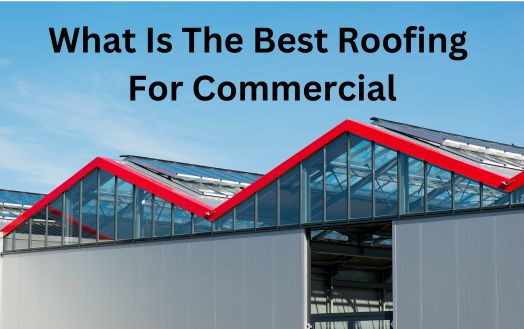
Welcome to our blog on the best roofing options for commercial properties. Choosing the right roof for your commercial building is crucial, as it impacts the energy efficiency, safety, and overall value of your business. In this article, we will explore what is the best roofing for commercial, their benefits and drawbacks, and factors to consider when selecting the best roofing option for your specific needs. Whether you own an office building, retail store, or industrial facility, understanding the different roofing materials and technologies available will help you make an informed decision. So let’s dive in and discover the best commercial leak repair NJ and roofing solution for your commercial property.
Commercial roofing refers to roofs specifically designed for commercial properties such as office buildings, shopping centers, warehouses, and factories. These roofs are typically larger in size and constructed to withstand the unique challenges of commercial buildings. There are various types of commercial roofing systems available, each with its own advantages and considerations. From metal roofing systems to PVC or TPO roof membranes, shingle roofing systems, spray-on roofing, and commercial cool roofing, it’s important to understand the different options to make an informed decision for your commercial roof.
Choosing the right roof for your commercial property is of utmost importance. A well-selected commercial roofing system can significantly impact your building’s energy savings, maintenance costs, and overall longevity. When considering a new roof or roof replacement, building owners must consider environmental factors, energy efficiency, fire resistance ratings, and the specific needs of their commercial building. Additionally, partnering with professional commercial roofing contractor NJ can provide valuable insights and free estimates to help building owners make informed decisions. By choosing the best roofing option, commercial properties can ensure the safety, efficiency, and long-term value of their buildings.
When selecting a commercial roof, it is essential to consider various factors to ensure the best roofing option for your specific needs. Firstly, weather conditions in your area play a crucial role in determining the type of commercial roofing system that will withstand high winds, heavy rainfall, or extreme heat. Secondly, fire resistance ratings are critical for commercial buildings to comply with safety regulations and protect occupants. Lastly, energy efficiency should be taken into account to reduce energy costs and environmental impact. Evaluating the different roofing materials available, such as metal roofing, shingle roofing, PVC or TPO roof membranes, spray-on roofing, and commercial cool roofing, will help you make an informed decision that aligns with your building’s requirements.
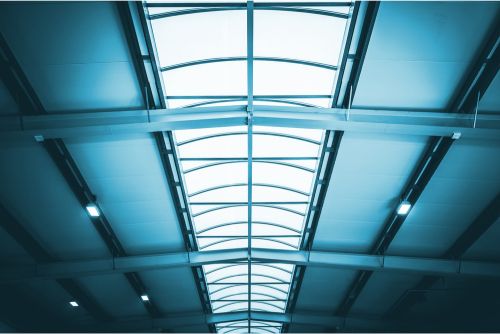
Now that we understand the importance of commercial roofing and the factors to consider, let’s take a closer look at what is the best roofing for commercial. From metal roofing systems to shingle roofing systems, spray-on roofing, commercial cool roofing, and green roofing, each type offers unique benefits and considerations. By exploring these options, building owners can choose the roofing material and system that best suits their commercial building’s needs. Whether you prioritize durability, energy efficiency, aesthetic appeal, or environmental sustainability, there is a commercial roofing option for you.
Metal roofing systems are popular choices for commercial properties due to their durability, longevity, low maintenance, and elegant appeal. Stainless steel, in particular, provides unparalleled strength and resistance against high winds, fire, and adverse weather conditions, making it an ideal option for commercial buildings. Metal roofs not only enhance the curb appeal of commercial properties but also reflect UV rays, reducing energy costs and promoting energy efficiency. With various metal roofing materials available, such as aluminum, copper, and zinc, building owners can choose a metal roof that meets their aesthetic preferences while providing long-term protection and performance for their commercial building.
PVC (Polyvinyl Chloride) and TPO (Thermoplastic Olefin) roof membranes are flexible, versatile, and resilient options for commercial roofing. These roofing materials offer strong fire resistance ratings, low maintenance costs, and energy savings, making them popular choices for commercial properties. PVC roofs provide excellent resistance to water damage, harsh weather conditions, and environmental factors, ensuring the durability of commercial buildings. TPO roof membranes, on the other hand, are known for their ease of installation, adaptability to various roof types, and energy efficiency. Their low slope design enhances performance, making them suitable for flat roofs commonly found in commercial buildings.
Shingle roofing systems, which are widely used in residential construction, are also viable options for commercial properties with low slope roofing. Asphalt shingles, in particular, offer several benefits such as cost-effectiveness, strong fire resistance, and energy efficiency. The variety of shingle materials available allows for customization based on specific building needs, preferences, and environmental factors. Selecting shingle roofing systems for commercial buildings can enhance curb appeal, provide a low-cost roofing solution, and contribute to energy savings. However, regular maintenance is required to prevent water damage and ensure the longevity of asphalt shingles against weather conditions, UV rays, and general wear and tear.
Shingle roofing systems offer several benefits for commercial properties, making them a popular choice among building owners. First and foremost, shingles enhance the curb appeal of commercial buildings, providing a wide selection of colors, textures, and styles to match architectural designs. As low cost roofing solutions, shingles are cost-effective options compared to other commercial roofing materials, making them an attractive choice for budget-conscious building owners. Additionally, shingles provide strong fire resistance ratings, contributing to the safety of commercial buildings. The energy efficiency of shingle roofing systems further promotes energy savings, reducing the environmental impact of commercial properties.
While shingle roofing systems offer numerous benefits, there are some potential drawbacks that building owners should consider. Regular maintenance is required to prevent water damage, especially in areas prone to heavy rainfall or extreme weather conditions. Periodic inspections and repairs are essential to prevent leaks, shingle blow-offs, and deterioration. Additionally, environmental factors, such as UV rays, may affect the longevity of asphalt shingles, requiring regular evaluation and proactive maintenance. It is also crucial to assess the cost of shingle roof replacement, as the materials may need to be replaced more frequently compared to other commercial roofing systems due to their susceptibility to damage from high winds and environmental factors.
Spray-on roofing, also known as SPF (Spray Polyurethane Foam) roofing, is gaining popularity in the commercial roofing company NJ. This innovative roofing system provides seamless, waterproof protection and can be applied to various roof types, including flat roofs commonly found in commercial buildings. Spray-on roofing offers strong resistance to high winds, fire, water damage, and weathering, ensuring the safety and durability of commercial properties. It is cost-effective, quick to apply, and energy-efficient, making it a viable option for building owners seeking a durable, long-lasting roofing solution.
Businesses are increasingly opting for spray-on roofing due to its numerous benefits. Energy savings are a significant advantage, as spray-on roofing systems provide insulation, reducing the building’s reliance on heating and cooling, and subsequently lowering energy costs. The seamless application of spray-on roofing also eliminates the potential for water leaks, as there are no seams or joints for water to penetrate. Additionally, spray-on roofing materials have protective surface layers that guard against water damage, UV rays, and weathering, enhancing the durability of commercial roofs. The quick and efficient application process of spray-on roofing minimizes disruptions to commercial operations, making it an appealing option for building owners.
In addition to its energy efficiency benefits, spray-on roofing systems also have a positive environmental impact. Their strong fire resistance ratings reduce safety risks in commercial properties, while their low maintenance requirements contribute to overall environmental sustainability. Spray-on roofs provide energy savings by reducing heating and cooling demands, which, in turn, reduces carbon emissions. Furthermore, spray-on roofing materials, when properly installed, create a protective surface that reflects UV rays, reducing the urban heat island effect. These roofing systems also support air quality by minimizing air pollutant emissions, such as volatile organic compounds (VOCs), commonly found in other roofing materials.
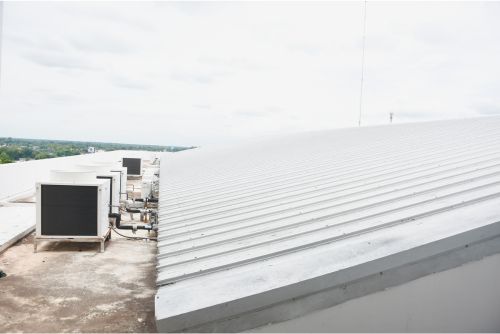
Commercial cool roofing has revolutionized energy efficiency and cost savings in commercial properties. This innovative roofing solution is designed to reduce energy costs by minimizing heat absorption, keeping the building cooler and reducing the demand for air conditioning. By reflecting a significant portion of sunlight and heat, commercial cool roofing materials provide insulation, creating a more comfortable indoor environment and decreasing energy consumption. The fire resistance ratings of commercial cool roofing systems ensure safety, while their technological advancements improve energy efficiency, environmental factors, and overall roofing performance, making them a preferred option for commercial properties seeking energy savings and enhanced sustainability.
Commercial cool roofing systems enhance energy efficiency by reducing the building’s reliance on air conditioning, therefore lowering energy costs. These roofing materials reflect a higher percentage of sunlight, including harmful UV rays, reducing the amount of heat absorbed by the building. By minimizing heat gain, commercial cool roofing systems create a cooler indoor environment, reducing the need for air conditioning, and subsequently lowering energy consumption. The energy savings achieved through commercial cool roofing contribute to environmental sustainability while providing building owners with long-term economic benefits. Whether it’s a high-rise office building, a retail center, or an industrial facility, commercial cool roofing improves energy efficiency while maintaining comfort and safety within commercial properties.
Commercial cool roofing systems offer several economic advantages for building owners. Firstly, they extend the lifespan of the roof, reducing maintenance and replacement costs over time. The energy savings achieved through commercial cool roofing systems lower energy costs, providing substantial financial benefits throughout the roof’s lifespan. Additionally, these roofing systems often qualify for energy efficiency incentives and rebates, further reducing operational costs for commercial properties. Aside from cost savings, commercial cool roofing enhances the curb appeal of buildings, adding value to the property and potentially attracting more tenants or customers. With their low cost, low maintenance, and long-term energy savings, commercial cool roofing systems are an appealing option for building owners seeking economic advantages.
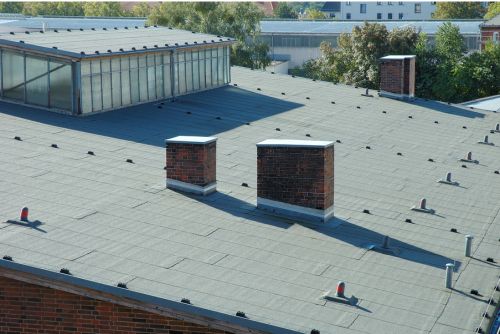
In addition to the more common types of commercial roofing systems, there are several less common, but equally effective options available. These include green roofing, liquid applied roofing, and the integration of photovoltaic (PV) solar panels into commercial roofs. These roofing solutions provide unique benefits that go beyond traditional roofing materials, such as environmental benefits, energy savings, and enhanced functionality. By exploring these less common commercial roofing options, building owners can find sustainable, cost-effective solutions that align with their specific needs, environmental goals, and energy efficiency aspirations.
Liquid applied roofing systems offer a viable solution for commercial properties with flat roofs. These systems involve the application of liquid materials, such as polyurethane or silicone, to create a protective, monolithic membrane over the roof surface. This seamless membrane adapts to the shape of the roof, ensuring complete coverage and protection against water damage. Liquid applied roofing systems are well-suited for flat roofs, as they provide strong resistance to water pooling, leaks, and structural damage caused by weather conditions. Their efficient application process, cost-effectiveness, and high-performance characteristics make liquid applied roofing a viable option for commercial properties seeking a durable, weather-resistant solution.
Green roofs, also known as living roofs, offer a unique roofing solution that merges aesthetics with functionality. These environmentally friendly roofing systems involve the installation of vegetation, such as grass, plants, or even trees, on the roof surface. Green roofs provide numerous environmental benefits, lower energy costs, and improved stormwater management, making them attractive options for commercial properties. Let’s take a closer look at the benefits of green roofs:
Integrating photovoltaic (PV) solar panels into commercial roofs offers a dual-purpose solution – harnessing renewable energy while providing roofing protection. PV solar panels convert sunlight into electricity, minimizing the building’s reliance on the grid and reducing the environmental impact of energy consumption. Commercial properties with photovoltaic solar panels experience energy savings, lower energy costs, and improve their overall energy efficiency. By utilizing underutilized roof space, commercial buildings optimize energy production, offset energy costs, and demonstrate environmental responsibility. As the solar energy industry advances, PV solar panels continue to evolve, presenting commercial properties with a sustainable, energy-efficient roofing option.
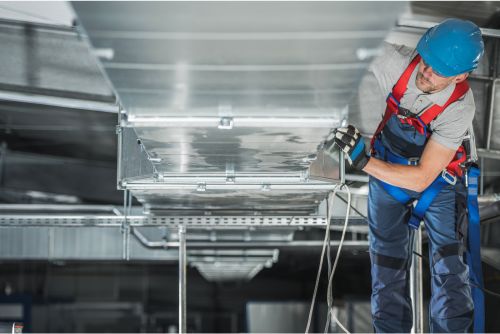
Commercial roofing materials and technologies have evolved significantly in recent years, providing building owners with innovative, high-performance options. From fire-resistant materials to new roofing construction techniques, commercial roofing systems continue to improve energy savings, environmental factors, and overall durability. As technology advances, new materials, such as ethylene propylene diene monomer (EPDM) roofing and bitumen roofs, offer enhanced weather resistance, low maintenance, and long-term performance. The evolution of commercial roofing materials and technologies represents a commitment to providing building owners with the best roofing solutions available, tailored to their specific needs, environmental factors, and energy efficiency goals.
Modern technology has revolutionized commercial roofing, bringing new construction techniques, materials, and services to the industry. With the advent of advanced roofing materials, commercial properties benefit from improved energy efficiency, fire resistance, and overall performance. Cutting-edge roofing solutions, including spray-on roofing, commercial cool roofing, and green roofing, prioritize energy savings, environmental factors, and air quality. Technological advancements in commercial roof repair NJ systems ensure durability, weather resistance, and low maintenance, providing building owners with peace of mind. Additionally, commercial roofing services offer expertise, free estimates, and high-quality installations to assist building owners in making informed decisions and achieving optimum roofing performance.
The future of commercial roofing is driven by sustainable and green roofing solutions, energy efficiency advancements, and the integration of emerging materials and technologies. Developing roofing materials that enhance energy efficiency, cost savings, and environmental factors will continue to shape the industry. Future trends in commercial roofing include:
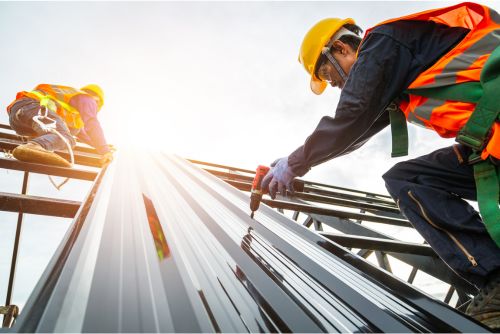
Determining the best roofing option for your commercial building requires careful consideration of various factors. By evaluating environmental factors, energy efficiency, fire resistance ratings, and building requirements, building owners can narrow down the options and select the best commercial roof type for their specific needs. The type of commercial roofing material, cost-effectiveness, maintenance requirements, and long-term performance should also be taken into account when making a decision. Seeking consultation from commercial roofing services, who offer insights, free estimates, and expertise, can further assist building owners in determining what is the best roofing for commercial property and ensure a successful roofing project.
Choosing a commercial roof involves evaluating several factors to ensure the best roofing option for your specific needs. Environmental factors, such as weather conditions, building location, and sustainability goals, play a crucial role in selecting the most suitable commercial roofing system. Energy efficiency is another important consideration, as it impacts long-term energy costs and environmental impact. Strong fire resistance ratings are essential for commercial properties, ensuring occupant safety and compliance with building codes. The type of commercial roofing material, including shingle roofing systems, metal roofing, spray-on roofing, or green roofing, should align with your building’s requirements. To make an informed decision, building owners should carefully assess environmental factors, energy efficiency, fire resistance ratings, maintenance needs, and budget constraints.
In conclusion, choosing the right roofing for your commercial property is crucial for its longevity, durability, and energy efficiency. Each type of commercial roofing material has its advantages and considerations that need to be taken into account. Whether you opt for metal roofing systems that offer a balance of elegance and durability, PVC or TPO roof membranes that provide versatility and resilience, shingle roofing systems with their benefits and potential drawbacks, spray-on roofing for its increasing popularity and environmental impact, or even explore less common options like liquid applied roofing, green roofs, or photovoltaic solar panels, it’s important to weigh the factors that are specific to your needs. With the evolution of commercial roofing materials and technologies, it’s essential to stay updated on modern advancements and future trends. Consult with a professional roofing contractor to determine the best roofing option for your specific requirements and ensure a reliable and efficient solution for years to come.